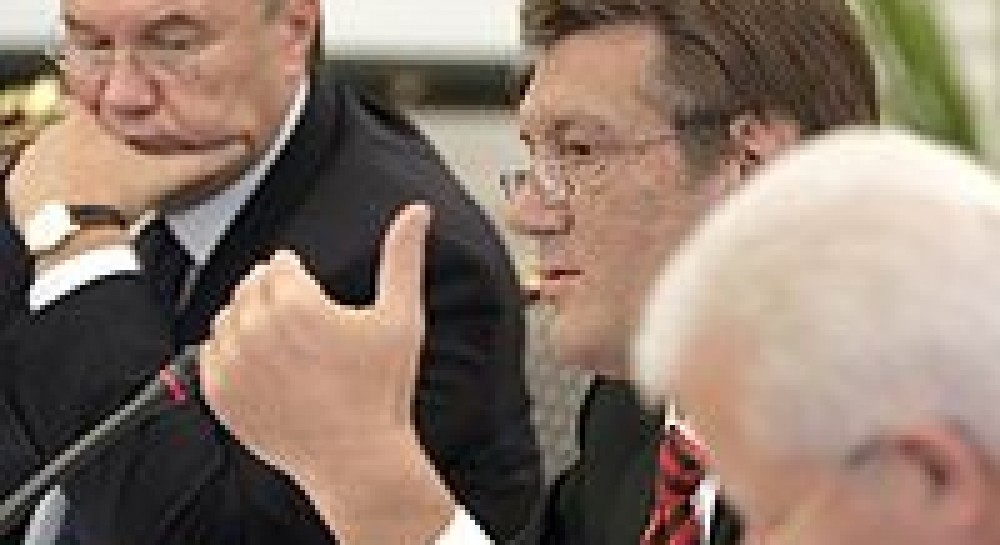
Preparations for a new government
With the Sept. 30 parliamentary election now all but certain in Ukraine, the focus has shifted to developing campaign partners and identifying potential government coalitions following the poll. Early political jockeying suggests a positive movement...
With the Sept. 30 parliamentary election now all but certain in Ukraine, the focus has shifted to developing campaign partners and identifying potential government coalitions following the poll. Early political jockeying suggests a positive movement in Ukraine’s democratic development, but there are also hints of potential problems following the election. In particular the prospects for a renewal of Ukraine’s reformist “orange” government are uncertain – even if Ukraine’s voters support such a move at the ballot box.
Last week, President Viktor Yushchenko presided over the signing of a “Declaration of the Unification of Democratic Forces,” bringing ten reformist parties together into one election bloc. The new grouping will include Yushchenko’s People’s Union Our Ukraine party, Yuriy Lutsenko’s People’s Self-Defense organization, and both Rukh national-democratic parties. The bloc will be called “The Our Ukraine-People’s Self-Defense Bloc” (OUPSD) and has the potential to make a significant difference in the upcoming election.
Ukraine’s most reliable surveys suggest that the parties and blocs supporting the president will garner almost equal votes to those supporting his historical rival, Prime Minister Viktor Yanukovych. This new bloc is meant to ensure that every pro-presidential vote cast during the election counts. This was not the case during the 2006 parliamentary elections.
During that election, several staunchly pro-Western parties gained roughly four percent of the vote but did not pass the three percent threshold to enter parliament. Their votes were redistributed among the five larger parties that passed the threshold. In an election when a majority coalition may be formed by a difference of only two to five percent, those votes could be essential.
But these votes will only matter if Yushchenko and OUPSD choose to ally with former Prime Minister Yulia Tymoshenko’s bloc, and not with Yanukovych’s Party of Regions. Given the current situation there should be no question on this point. In February, Our Ukraine signed an extremely detailed “Agreement on a Unified Opposition” with The Bloc of Yulia Tymoshenko (Byut). Together, the blocs controlled roughly 200 out of 450 seats. This agreement was the third formal agreement between the two blocs – the first solidified Tymoshenko’s support for Yushchenko’s presidency in 2004, while the second created a stillborn “majority coalition” following the 2006 elections.
This latest document contains not only a specific program of action while in opposition but also two vital subsections dealing with the possible creation of a majority government. The “Program of the Coalition of Democratic Forces” and the “Regulations of the Coalition of Democratic Forces” spell out in detail, (over 89 pages) the foreign and domestic policies of the united “democratic forces.” The document includes dozens of pieces of legislation approved by both organizations. It details specific guidelines for assigning portfolios, granting the premiership to the party that polls highest, and splitting the rest of the cabinet positions 50-50 regardless of electoral result.
As recently as July 5, Yuriy Lutsenko, who is number one on the OUPSD electoral list, called Byut “our only ally in the parliament of the next convocation.” But there are indications that the President is wavering on this question.
In an interview on July 8 the President refused to say whether he supported a coalition of his bloc with Yanukovych’s Party of Regions or with Byut. Instead, he said that he “[did] not want to close any path for negotiation,” and “if a coalition with Byut fails to be formed, then there will be another.” As a result of these and previous statements, Ukrainian media have begun to suggest that an agreement between Yushchenko and the Party of Regions (although perhaps not Yanukovych himself) is a possibility. The Economist went as far as to call such an agreement “likely.”
Given the fragile nature of Ukraine’s democracy, this kind of uncertainty is dangerous.
It is likely that OUPSD leaders find any discussion of a coalition with Yanukovych’s party difficult given that major disagreements between Yushchenko and the Yanukovych government led to parliament’s dismissal.
Of most concern to Yushchenko, the pro-Yanukovych parliamentary majority had grown from 232 members to at least 250, thanks to what Yushchenko charged were illegal bribes and intimidation.
After dismissing parliament, Yushchenko himself spoke of “betrayals” and “political corruption at the highest level of government in Ukraine.” He may find it difficult to backtrack on these statements.
In actuality, it is likely that the majority of OUPSD has no intention of working with the Party of Regions. Within the bloc there are many committed, pro-Western reformers who did not agree with the program or tactics of the Yanukoych government and who do not believe these will change following the election.
However, the Declaration signed last week clearly marked the new bloc as a presidential champion – perhaps in advance of the presidential elections of 2009. The democratic forces are uniting, the declaration states, “in support of the political course of the President of Ukraine Viktor Yushchenko and in agreement with his actions to defend the rights and freedoms of the Ukrainian people.”
Therefore, after the election, his new bloc will look to him to set the tone. So far, while Yushchenko has involved himself in promoting OUPSD, he has avoided committing to a future coalition government with the bloc’s current partner. It is possible that the Party of Regions and its allies will win a clear majority in the election, making Yushchenko’s choice clear. More likely, however, his bloc will need to choose between the Party of Regions and Byut. Yushchenko should clearly tell the Ukrainian people which choice he will advocate.
By Tammy Lynch, Kyiv Post
Tammy Lynch is a Senior Research Fellow at Boston University’s Institute for the Study of Conflict, Ideology & Policy.

